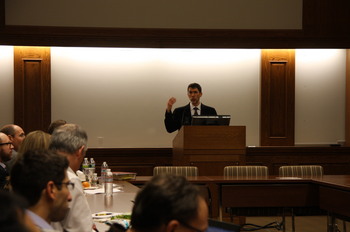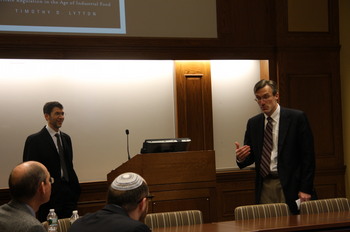
PPR seminar speaker says kosher certification offers regulatory model.
The market for kosher food products has grown to more than $12 billion annually, with an estimated 12 million consumers buying kosher-certified products in the United States. In an event hosted by the Penn Program on Regulation, Albany Law School Professor Timothy Lytton argued that kosher food regulation serves as a model for how third-party private certification can effectively regulate an industry. The kosher model, he suggested, offers insights into how private certification can enhance food safety and nutritional labeling.
According to Lytton, only 8% of kosher consumers are religious Jews who buy exclusively kosher food. Most consumers buy kosher food for reasons related to food safety, health, allergies, or religious restrictions such as halal.
The system of private third-party kosher certification of industrially prepared and packaged food began in the second half of the twentieth century following decades of fraud and corruption in kosher meat production. A network of professionalized certification agencies replaced individual rabbis who had historically overseen kosher food production.
Today, in order to obtain kosher certification, a food producer signs a contract with a certifying agency. Monitoring is conducted on an on-going basis and fees vary based on the nature of the production. While there are over three hundred kosher certification agencies in the US, a group known as the “Big Five” control 80% of the market.
Professor Lytton found that private kosher certification agencies overcame a number of common sources of regulatory failure, such as regulatory capture, insufficient resources, and inadequate enforcement. In his talk, Professor Lytton pointed out that, today, kosher fraud is extremely rare, and that when it does occur, agencies are quick to alert consumers and order product recalls.

PPR Director Cary Coglianese
Professor Lytton argued that the relative lack of fraud in the kosher food industry can be partially attributed to a core of vigilant consumers. He explained that the 8% of religiously observant kosher consumers who eat only kosher food frequently discover problems and alert agencies. They also spread agency alerts through social networks, enhancing consumer protection. In addition, these consumers keep the agencies on their toes. The agencies are careful to avoid mistakes and prevent misconduct in order to maintain their reputation for reliable certification.
In the end, Lytton concluded that kosher certification provides a successful model of reliable private certification that could point the way to reforming other forms of private third-party regulation that have not performed as well, such as private food safety audits and front-of-package nutritional labeling.
Lytton’s talk at the University of Pennsylvania Law School drew on his new book, Kosher: Private Regulation in the Age of Industrial Food, recently published by Harvard University Press.



